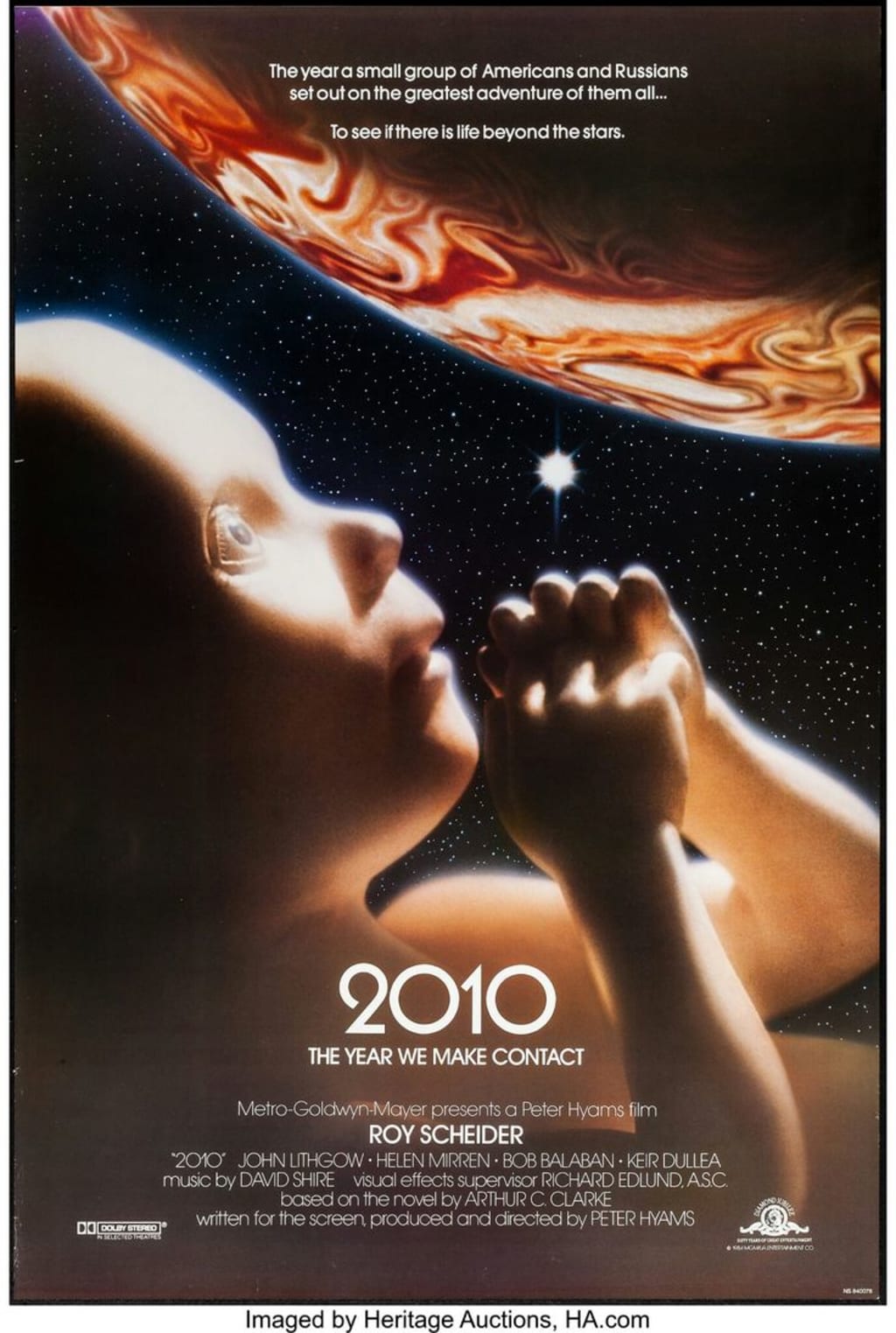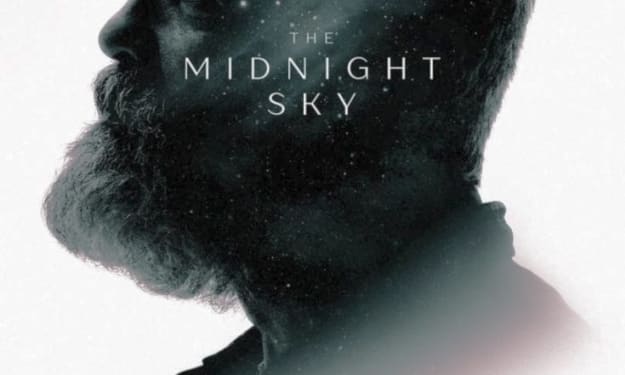Genuine Review of the 1984 Sci-fi/Adventure Film '2010: The Year We Make Contact'
2010: The Year We Make Contact (1984): A Honest Film Review

"2010: The Year We Make Contact," directed by Peter Hyams and released in 1984, is the sequel to Stanley Kubrick's iconic "2001: A Space Odyssey." Based on Arthur C. Clarke's novel "2010: Odyssey Two," the film continues the story of humanity's exploration of space and the mysterious monoliths that signal contact with an advanced alien civilization. Starring Roy Scheider, John Lithgow, Helen Mirren, and Bob Balaban, "2010" builds on the enigmatic legacy of its predecessor, offering a more straightforward narrative and a sense of urgency and tension.
Plot Summary:
The film is set nine years after the events of "2001." In 2010, tensions between the United States and the Soviet Union have escalated to the brink of war. Amid this backdrop, a joint American-Soviet mission is launched to investigate the abandoned spaceship Discovery One, which has been orbiting Jupiter since the mysterious disappearance of its crew and the malfunction of its AI, HAL 9000.
The crew of the Soviet spaceship Alexei Leonov, led by Commander Tanya Kirbuk (Helen Mirren), includes American astronauts Dr. Heywood Floyd (Roy Scheider), Dr. Walter Curnow (John Lithgow), and Dr. R. Chandra (Bob Balaban), the creator of HAL 9000. Their mission is to uncover what happened to Discovery One and to restart HAL 9000 to gain insights into the enigmatic monolith orbiting Jupiter.
As the Leonov approaches Jupiter, the crew faces various challenges, including the looming threat of geopolitical conflict on Earth and the unknown dangers of space. They discover that the monolith has transformed Jupiter into a mini-sun, which eventually causes the disintegration of the planet. The mission culminates in a dramatic escape as they return to Earth, carrying a message of hope and a warning from the alien intelligence.
Visual and Technical Excellence:
"2010" excels in its depiction of space travel and the celestial wonders of our solar system. The special effects, though not as groundbreaking as those in "2001," are impressive for their time and effectively create an immersive experience. The film's portrayal of Jupiter and its moons, particularly the transformation of Jupiter into a second sun, is visually stunning and adds to the sense of awe and mystery.
The interior design of the Leonov and Discovery One is meticulously detailed, reflecting the realistic and practical aspects of space travel. The zero-gravity scenes, spacewalks, and the depiction of the monolith maintain the film's connection to the grandeur and intrigue of "2001."
Suspense and Tension:
"2010" builds suspense through its well-paced narrative and the constant sense of urgency. The dual threats of a geopolitical crisis on Earth and the unknown dangers surrounding Jupiter keep viewers engaged. The film's tension is heightened by the interactions between the American and Soviet crew members, reflecting the precariousness of their collaboration.
The revival of HAL 9000, the AI responsible for the events in "2001," adds another layer of suspense. Dr. Chandra's efforts to reboot HAL and uncover the truth about the previous mission create moments of uncertainty and anticipation. The climactic escape from Jupiter, as the planet transforms into a mini-sun, provides a thrilling and visually spectacular conclusion.
Character Development and Performances:
The cast of "2010" delivers strong performances that bring depth and humanity to their roles. Roy Scheider as Dr. Heywood Floyd is particularly compelling, portraying a character driven by a sense of duty and curiosity. His interactions with the Soviet crew, especially Commander Tanya Kirbuk, played by Helen Mirren, highlight the themes of cooperation and mutual respect.
John Lithgow as Dr. Walter Curnow and Bob Balaban as Dr. R. Chandra add to the film's dynamic, each bringing their unique perspectives and expertise to the mission. Balaban's portrayal of Chandra is especially notable for its nuanced depiction of the relationship between a creator and his creation, as he grapples with HAL's past actions and future potential.
Helen Mirren's performance as Commander Kirbuk is strong and authoritative, adding a layer of tension and respect between the American and Soviet characters. The ensemble cast's chemistry and the well-written dialogue help ground the film's sci-fi elements in relatable human experiences.
Themes and Reflections:
"2010" explores several themes, including the quest for knowledge, the potential for cooperation amid conflict, and the profound implications of contact with extraterrestrial intelligence. The film reflects on humanity's enduring desire to explore and understand the universe, even in the face of immense danger and uncertainty.
The collaboration between the American and Soviet astronauts serves as a hopeful metaphor for overcoming geopolitical tensions through mutual goals and shared humanity. The film's resolution, with the message from the alien intelligence urging humanity to live in peace, underscores the possibility of unity and collective progress.
Critique and Unique Elements:
While "2010" successfully builds on the foundation of "2001," it lacks some of the ambiguity and philosophical depth that made Kubrick's film a timeless classic. The more straightforward narrative and explanatory approach may not appeal to all fans of the original. However, this accessibility can also be seen as a strength, making the film more approachable for a wider audience.
The unique element of "2010" lies in its balance of scientific realism and speculative fiction. The film effectively bridges the gap between the hard science of space travel and the imaginative possibilities of alien contact, creating a compelling and thought-provoking experience.
Conclusion:
In conclusion, "2010: The Year We Make Contact" is a visually captivating and emotionally engaging sequel that expands on the mysteries of "2001" while offering its own distinct narrative. With strong performances, particularly from Roy Scheider and Helen Mirren, and impressive special effects, the film provides a satisfying continuation of the story. It invites viewers to ponder the possibilities of human cooperation and the profound implications of our place in the universe.
Though it may not reach the iconic status of its predecessor, "2010" stands as a worthy and thought-provoking addition to the sci-fi genre, delivering a message of hope and unity that resonates in today's world. Whether you're a fan of space exploration, speculative fiction, or human drama, "2010: The Year We Make Contact" is a film that offers a rich and rewarding viewing experience.
About the Creator
Aarav Rohilla
Hey Everyone,
This is Aarav Rohilla, a young writer on a mission to craft captivating stories that resonate.
Join me on this journey of literary exploration and inspiration! 📝✨
Enjoyed the story? Support the Creator.
Subscribe for free to receive all their stories in your feed. You could also pledge your support or give them a one-off tip, letting them know you appreciate their work.
Reader insights
Outstanding
Excellent work. Looking forward to reading more!
Top insights
Compelling and original writing
Creative use of language & vocab
Easy to read and follow
Well-structured & engaging content
Excellent storytelling
Original narrative & well developed characters
Expert insights and opinions
Arguments were carefully researched and presented
Eye opening
Niche topic & fresh perspectives
Heartfelt and relatable
The story invoked strong personal emotions
Masterful proofreading
Zero grammar & spelling mistakes
On-point and relevant
Writing reflected the title & theme






Comments (1)
I appreciate your thoughtful commentary on the acting. Well-written!